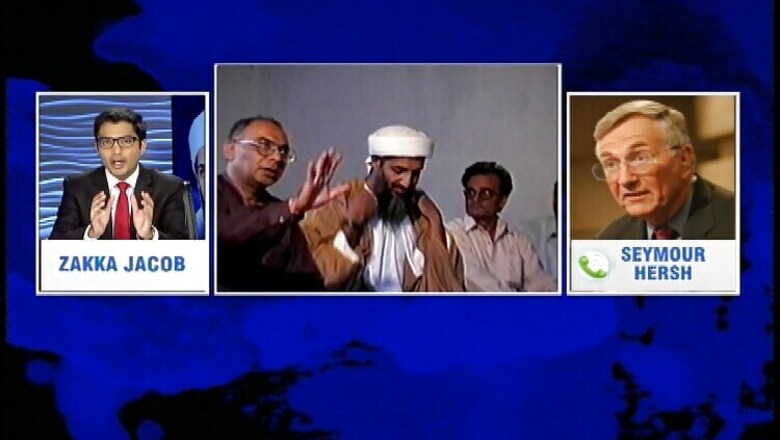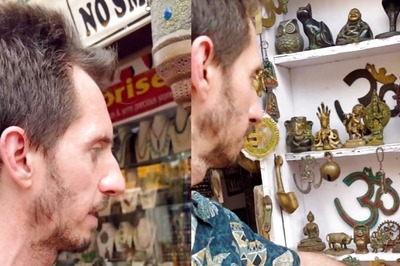
views
New Delhi: Seymour Myron "Sy" Hersh, noted American investigative journalist and political writer has spoken exclusively to CNN-IBN about Osama Bin Laden capture and other things. He claims that Pakistani ‘ignorance’ about Osama Bin Laden is laughable. He said, “a lot of people in the bureaucracy knew this". Here's an excerpt from his detailed interview to CNN-IBN Deputy Executive Editor Zakka Jacob.
Question: First of all have you got a chance to listen to what Chaudhry Ahmed Mukhtar said, that he knew, Zardari knew and Kayani knew about Osama?
Answer: I have not heard it, but I have certainly heard the transcript twice. Yes.
Question: What do make of it? Your initial thoughts?
Answer: What I make of it? Look, I will take it further a little bit. I have learnt things since the publication of my story. I have been contacted by people, this inevitably happens, one goes on from a story. There are a lot of things to write about, Syria for example, what is going on between America and Russia, and I want to be the first to start a 'be kinda like Putin' club here in America but I seem to be in a minority.
But anyway, what I make of it is that you have to understand that the Pakistani radar system was very sophisticated. It was built with American aid, enormous amount of American aid after the ISI and the Pak military started helping us in the proxy war against Russia that we were running in Afghanistan beginning in 1979 80, beginning..and if you remember that's how we got connected with Bin Laden and other jihadist groups which the Americans were using to fight the Russians. So we decided to help Pakistan build a very sophisticated radar system. And as I said, as I have since learnt it was probably 3D, auditable radar system. Auditable means you can’t erase that image which then means the problem you had was that if the Americans were coming in advance as was said by the Defence Minister, I think that's accurate. Everybody knew it. It seems clear to me. I haven't reported it but it brings the logical assumption that the radar system was chucked out in Pakistan for some time. Otherwise you would have images you didn't want, which is really tricky. It leaves a huge security gap and it took so long for someone in Pakistan to speak out. I thought they would much earlier.
Question: So you are saying that these radar systems were most likely turned off deliberately, and people in the highest leadership knew this and the reason they did this was because they didn't want the auditable radars to record these images. Is that right?
Answer: What I am saying is that since that story, I have been told something that makes enormous sense to me. I do know we built a very sophisticated radar system for Pakistan. It's all online. It's amazing that more American journalists didn't take a look at it. Over 900 million dollars being spent on various companies, all public information because these contracts were let publically for the construction of these radars. And I have been told, after I put out this story that the system was a very sophisticated auditable, 3D system. It would have had to be. I am saying it's worth investigating, worth asking about whether or not the system was actually turned off for a few hours so as to accommodate the United States. That would be worth asking. I am not saying I know anything empirically. It's of great interest to me. There's a lot more reporting to be done on this.
There were air defence officials who are monitoring all the aircraft flying in their airspace all the time. You have the defence officials involved, you had the anti-missile guys who would've known..there are a whole lot of different commands who would've known an awful lot. So when the defence minister said the extent of knowledge went beyond just a few people, I think he knows what he's talking about. A lot of people in the bureaucracy knew this.
Question: Mukhtar said that Zardari knew, and Kayani knew?
Answer: And some other people knew, because there were some significant job shifts. If you look at the records there were significant job shifts. People were reassigned within a few months, other jobs and those are the ones who protested about what happened. You can imagine, if you spent your whole life in Air Defence. Let's say you are the Chief Marshal of Air Defence and you're going to have to pretend that your air radar not only missed two helicopters coming in but if you remember the story one of our helicopters, the American helicopters crashed and they had to bring in a Vietnam war two engine large Osprey its called, chopper that can take 55 people to rescue the others. So you are talking about a huge chopper, not some stealthy Black Hawk. You are talking about a tube carrier that your radar couldn't detect which is going at a 150 km or 160 at the most. The story is laughable.
Question: My larger question is why then hasn't this narrative been challenged by the Americans?
Answer: Because the narrative was given by the White House. The White House said we got Bin Laden, we are talking about 2011, a year before re-election, he's an African American man running, this could be very important to get Bin Laden. So that narrative was everything went perfectly. We got him. It was great. People had for OBL. Once the story was made public that he was killed in Abottabad, it wasn't supposed to be made public, but once it was the military had two options. Either play dumb and say everything failed, our air defences failed, our airplanes didn't detect them, our anti-aircraft defences failed everybody failed to detect two planes or admit that at least they were acquiescent or they were aware that the mission was going to take place. And that would cause enormous rage inside. They were much better off taking the heat.
Question: And one final question, in terms of how do you think this story now plays out. This is the first time that somebody who was in the higher echelons of government, the defence minister admitting that they were in on this?
Answer: I would say anybody in this country, the newspapers, the reporters following up with what you had is pretty much nil. The response to my stuff initially was to accuse me of having lost my mind. And then the next step was, within a week, the reporters who covered this issue said well we all knew that Pakistan had to be involved. It went from 'I must be crazy' to 'we all had it'.
(Hersh is a regular contributor to The New Yorker magazine on military and security matters. He has also won two National Magazine Awards and is a five-time Polk winner and recipient of the 2004 George Orwell Award. He first gained recognition in 1969 for exposing the My Lai Massacre and its cover-up during the Vietnam War, for which he received the 1970 Pulitzer Prize for International Reporting. He, in 2004, reported on the US military's mistreatment of detainees at Abu Ghraib prison)
















Comments
0 comment